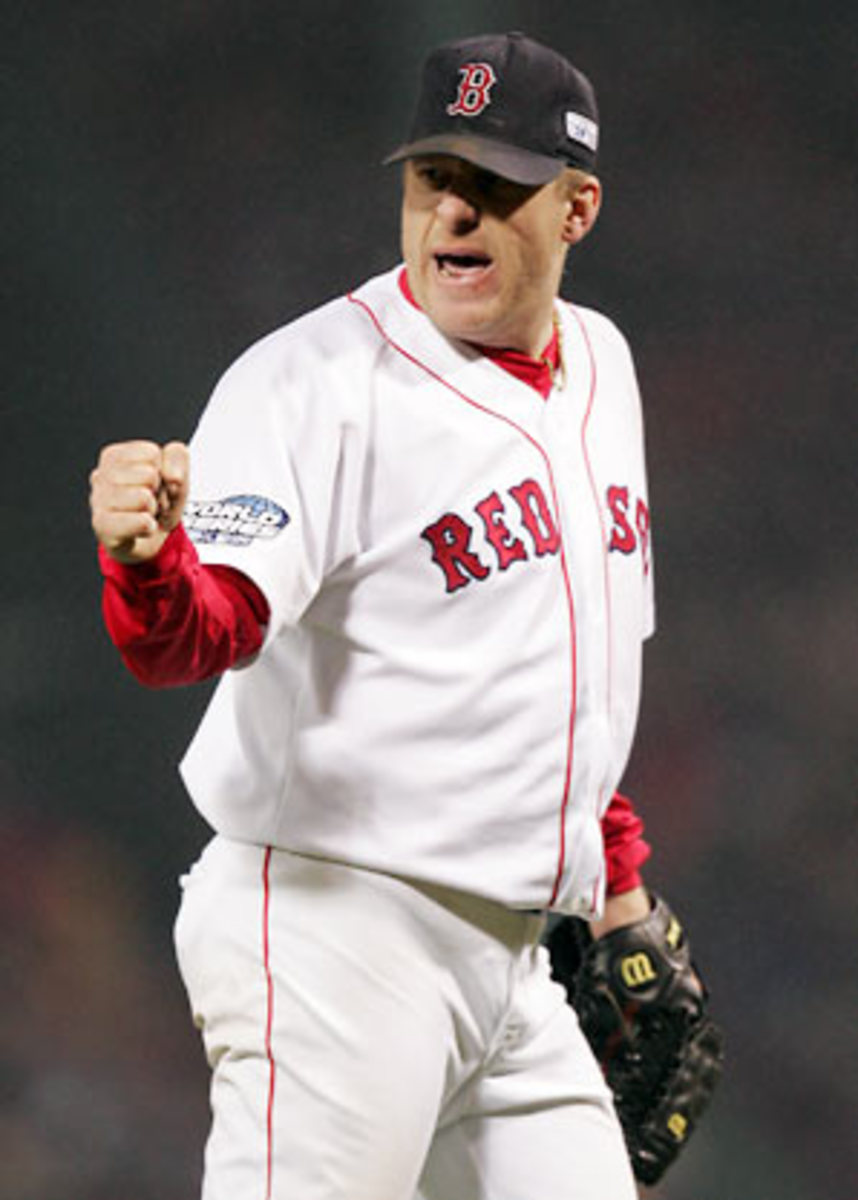Schilling's Hall candidacy, playoff brilliance and outspoken demeanor
SI.com's Joe Lumley spoke with Sports Illustrated senior writer Tom Verducci on Monday about Curt Schilling's retirement.
SI.com: First things first: Is Curt Schilling a Hall of Famer?
Verducci: I believe that he is. His regular season numbers make him a borderline candidate, but his greatness in the postseason is what puts him over the top. The other thing I really find impressive about him is of all the pitchers who've won at least 200 games, he has the best strikeout-to-walk ratio (4.38) of anybody in history. I like the fact that he was a power pitcher who combined control.
SI.com: Would you say he's a first-ballot Hall of Famer?
Verducci: I'm guessing that he's not going to be a first-ballot Hall of Famer. It's really tough to do that in your first year, to get that 75 percent. His career is somewhat parallel to that of Don Drysdale, and it took Drysdale a few ballots to get in. If he's not a first-ballot Hall of Famer, I don't think it's going to take too many for him to get in.
SI.com: How does Schilling rank among the pitchers of his era (John Smoltz, Roger Clemens, Greg Maddux, Pedro Martinez, etc.)?
Verducci: He's not in the top three or four. The guys I would put ahead of him: Greg Maddux, Randy Johnson, Pedro Martinez, Roger Clemens, John Smoltz, Tom Glavine. But Schilling's right there in that next group, and certainly I think if you were to put up a short list of pitchers who you'd trust to pitch very well in a big game, Schilling's on anybody's list.
SI.com: With an 11 -2 postseason record, three World Series rings and a World Series MVP, would you say Schilling is the best, or at least one of the best, postseason pitchers of all time?
Verducci: You know, it's hard to define the absolute best. Christy Mathewson was pretty darn good. But I would just go by his generation. I would pick him and John Smoltz as the best big-game pitchers of this generation.
SI.com: Where would you say that Schilling had the biggest impact: Philadelphia, Arizona or Boston?
Verducci: That's a great question, and I'm really anxious, or eager, to see if he does get in, what team he will choose to represent. He won the most games with the Phillies. He won the most World Championships with the Red Sox. But he actually won more games with the Diamondbacks than he did with the Red Sox. And I think the absolute top of his career was 2001 and 2002 with the Diamondbacks. Including the postseason, in those two years he was 49-13 with 571 1/3 innings. And he was age 34 and 35 when he did that. So I would say his biggest impact -- just purely on a performance basis -- came with the Diamondbacks. But I think in terms of what he gave a franchise, his impact on the Red Sox in 2004 goes beyond any other.
SI.com: What playoff performance do you think he's going to be most remembered for: 2001, when he won World Series Co-MVP with Johnson, or 2004, when he pitched in the ALCS with the bloody sock and went on to win the World Series, breaking the Curse of the Bambino?
Verducci: I don't think there's any doubt it's the bloody sock game. That is one of the iconic pitching performances of all time. To win an elimination game at Yankee Stadium, force a Game 7, obviously then to break the curse ... but to do it on an ankle that was basically held together with scotch tape and bailing wire, and just completely dominate the Yankees for seven innings, it's one of the legendary performances of all time. And as great as he pitched in 2001 -- and even in Game 7 in that battle with Roger Clemens -- there's no doubt the bloody sock is going to be at the top of the list.
SI.com: Did Curt Schilling's outspoken demeanor ever overshadow his on-field performance?
Verducci: I think his outspokenness actually enhanced his on-field performance. A lot of people got to know Curt Schilling not only by what he did on the field but by what he said off the field. It wasn't always good, but it certainly raised his profile, and he became a household name. People either liked or resented the swagger that he showed on the field and especially off the field. I think it cuts both ways. And actually, I would say it cuts both ways even with teammates and his peers, not just baseball fans.
SI.com: In 2003, Brian Cashman passed on signing Schilling. In terms of each team's success over the past five years, would the rivalry look a little different if Schilling had gone to the Yankees?
Verducci: There's no doubt about that. The Yankees -- in those years after 2003 -- really missed the true ace at the top of their rotation, especially somebody who could strike people out. And as closely as the Red Sox had battled the Yankees, they were missing that one-two punch with Pedro to have somebody else to match up against the Yankee lineup. Curt Schilling was the tipping point in the rivalry, and I'm sure things would've been different -- how different, I don't know. But certainly he paid immediate dividends, considering the Red Sox were able to do something that they hadn't done in 86 years, in large part because he was there.






